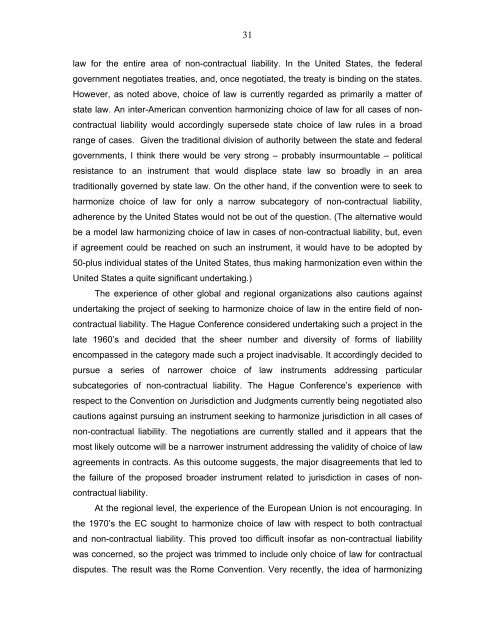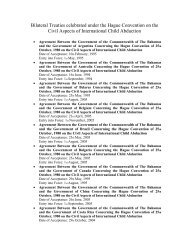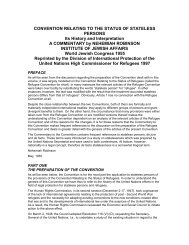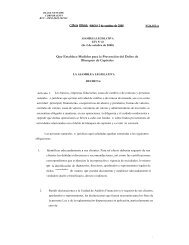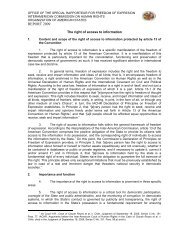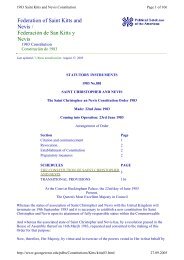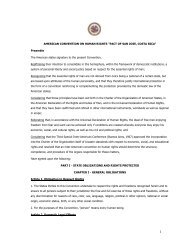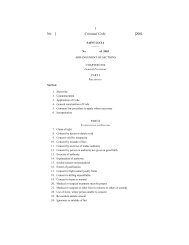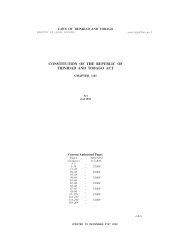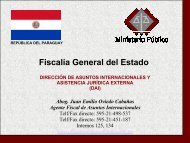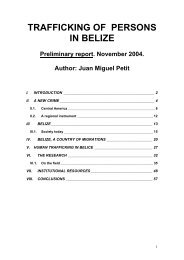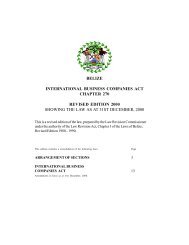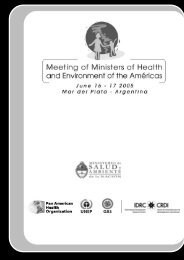Jurisdiction and choice of law for non-contractual obligations ... - OAS
Jurisdiction and choice of law for non-contractual obligations ... - OAS
Jurisdiction and choice of law for non-contractual obligations ... - OAS
You also want an ePaper? Increase the reach of your titles
YUMPU automatically turns print PDFs into web optimized ePapers that Google loves.
31<br />
<strong>law</strong> <strong>for</strong> the entire area <strong>of</strong> <strong>non</strong>-<strong>contractual</strong> liability. In the United States, the federal<br />
government negotiates treaties, <strong>and</strong>, once negotiated, the treaty is binding on the states.<br />
However, as noted above, <strong>choice</strong> <strong>of</strong> <strong>law</strong> is currently regarded as primarily a matter <strong>of</strong><br />
state <strong>law</strong>. An inter-American convention harmonizing <strong>choice</strong> <strong>of</strong> <strong>law</strong> <strong>for</strong> all cases <strong>of</strong> <strong>non</strong><strong>contractual</strong><br />
liability would accordingly supersede state <strong>choice</strong> <strong>of</strong> <strong>law</strong> rules in a broad<br />
range <strong>of</strong> cases. Given the traditional division <strong>of</strong> authority between the state <strong>and</strong> federal<br />
governments, I think there would be very strong – probably insurmountable – political<br />
resistance to an instrument that would displace state <strong>law</strong> so broadly in an area<br />
traditionally governed by state <strong>law</strong>. On the other h<strong>and</strong>, if the convention were to seek to<br />
harmonize <strong>choice</strong> <strong>of</strong> <strong>law</strong> <strong>for</strong> only a narrow subcategory <strong>of</strong> <strong>non</strong>-<strong>contractual</strong> liability,<br />
adherence by the United States would not be out <strong>of</strong> the question. (The alternative would<br />
be a model <strong>law</strong> harmonizing <strong>choice</strong> <strong>of</strong> <strong>law</strong> in cases <strong>of</strong> <strong>non</strong>-<strong>contractual</strong> liability, but, even<br />
if agreement could be reached on such an instrument, it would have to be adopted by<br />
50-plus individual states <strong>of</strong> the United States, thus making harmonization even within the<br />
United States a quite significant undertaking.)<br />
The experience <strong>of</strong> other global <strong>and</strong> regional organizations also cautions against<br />
undertaking the project <strong>of</strong> seeking to harmonize <strong>choice</strong> <strong>of</strong> <strong>law</strong> in the entire field <strong>of</strong> <strong>non</strong><strong>contractual</strong><br />
liability. The Hague Conference considered undertaking such a project in the<br />
late 1960’s <strong>and</strong> decided that the sheer number <strong>and</strong> diversity <strong>of</strong> <strong>for</strong>ms <strong>of</strong> liability<br />
encompassed in the category made such a project inadvisable. It accordingly decided to<br />
pursue a series <strong>of</strong> narrower <strong>choice</strong> <strong>of</strong> <strong>law</strong> instruments addressing particular<br />
subcategories <strong>of</strong> <strong>non</strong>-<strong>contractual</strong> liability. The Hague Conference’s experience with<br />
respect to the Convention on <strong>Jurisdiction</strong> <strong>and</strong> Judgments currently being negotiated also<br />
cautions against pursuing an instrument seeking to harmonize jurisdiction in all cases <strong>of</strong><br />
<strong>non</strong>-<strong>contractual</strong> liability. The negotiations are currently stalled <strong>and</strong> it appears that the<br />
most likely outcome will be a narrower instrument addressing the validity <strong>of</strong> <strong>choice</strong> <strong>of</strong> <strong>law</strong><br />
agreements in contracts. As this outcome suggests, the major disagreements that led to<br />
the failure <strong>of</strong> the proposed broader instrument related to jurisdiction in cases <strong>of</strong> <strong>non</strong><strong>contractual</strong><br />
liability.<br />
At the regional level, the experience <strong>of</strong> the European Union is not encouraging. In<br />
the 1970’s the EC sought to harmonize <strong>choice</strong> <strong>of</strong> <strong>law</strong> with respect to both <strong>contractual</strong><br />
<strong>and</strong> <strong>non</strong>-<strong>contractual</strong> liability. This proved too difficult ins<strong>of</strong>ar as <strong>non</strong>-<strong>contractual</strong> liability<br />
was concerned, so the project was trimmed to include only <strong>choice</strong> <strong>of</strong> <strong>law</strong> <strong>for</strong> <strong>contractual</strong><br />
disputes. The result was the Rome Convention. Very recently, the idea <strong>of</strong> harmonizing


